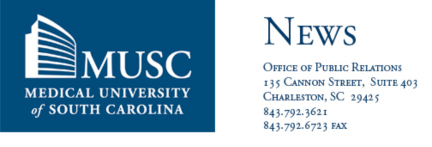
Nov. 3, 2011
CHARLESTON -- The Medical University of South Carolina (MUSC) Department of Psychiatry and Behavioral Sciences has recently joined the National Network of Depression Centers (NNDC), which links together more than 20 leading medical centers across the country working to improve the lives of those struggling with depression. The department received this designation due to a national reputation as a leader in depression research and a commitment to advancing knowledge and care of patients with depression.
The network brings together leading depression centers and academic medical centers to transform the field of mood disorders, thus making diagnosis and treatment more affordable, accessible, and acceptable. Creating similar networks in other disease specialties, such as The National Cancer Institute, has been tremendously successful in advancing understanding of disease as well as improving treatments and reducing stigma. By creating a similar national network of leading depression centers, systematic data can be shared with experts at those centers, while each multidisciplinary center will offer a unique area of depression expertise and future research.
MUSC's unique contributions to the national network includes the university's Comprehensive Depression Center (CDC), providing expertise in the areas of brain stimulation methods in the treatment of mood disorders and pain, depression in medical disease, women's reproductive bio-behavioral health, and brain and creativity, a novel concept in terms of better understanding the artistic community and their mental well-being.
"When you look across people with great creativity, there seems to be an increased prevalence of addiction and depression problems," said Thomas Uhde, M.D., chairman of the Department of Psychiatry and Behavioral Services, executive director of the Institute of Psychiatry, and interim CDC director. "It could be that great creativity lives within a part of the brain that overlaps the brain regions responsible for mood and anxiety. Anecdotally, clinicians struggle to treat these people because the trade-off for successful treatment is sometimes what the patients complain about as a loss of their creative edge."
He further explained that these creative patients seem to have higher rates of relapse and suicide as a result. The idea behind this new research approach is to bring together clinicians with an interest in finding new ways to treat artistic people who suffer from depression or substance abuse without damaging their creative inclinations. One major initiative of the brain and creativity area will be to introduce the university's dedication to understanding these disorders into the Charleston arts community. The purpose in forming a task force on the brain and creativity is to demonstrate a partnership between the providers and those who struggle. "The first step will be to establish baseline measures, but ultimately we want to see if we can find ways to treat talented and creative people in a way that enhances that part of them, not take away from it."
Uhde thinks the work could also translate into depression research related to medical professionals, a group that is well known to have high rates of depression and suicide but is often reluctant to seek mental health treatment for a myriad of reasons. "Who's helping the helpers? I think MUSC in particular is well poised to further this research because we have several colleges that we could work with right here on campus to implement community outreach education about depression amongst care providers," he said. For more information about the network, visit www.nndc.org.
About MUSC
Founded in 1824 in Charleston, The Medical University of South Carolina is the oldest medical school in the South. Today, MUSC continues the tradition of excellence in education, research, and patient care. MUSC educates and trains more than 3,000 students and residents, and has nearly 11,000 employees, including 1,500 faculty members. As the largest non-federal employer in Charleston, the university and its affiliates have collective annual budgets in excess of $1.7 billion. MUSC operates a 750-bed medical center, which includes a nationally recognized Children's Hospital, the Ashley River Tower (cardiovascular, digestive disease, and surgical oncology), and a leading Institute of Psychiatry. For more information on academic information or clinical services, visit www.musc.edu or www.muschealth.com.
#####